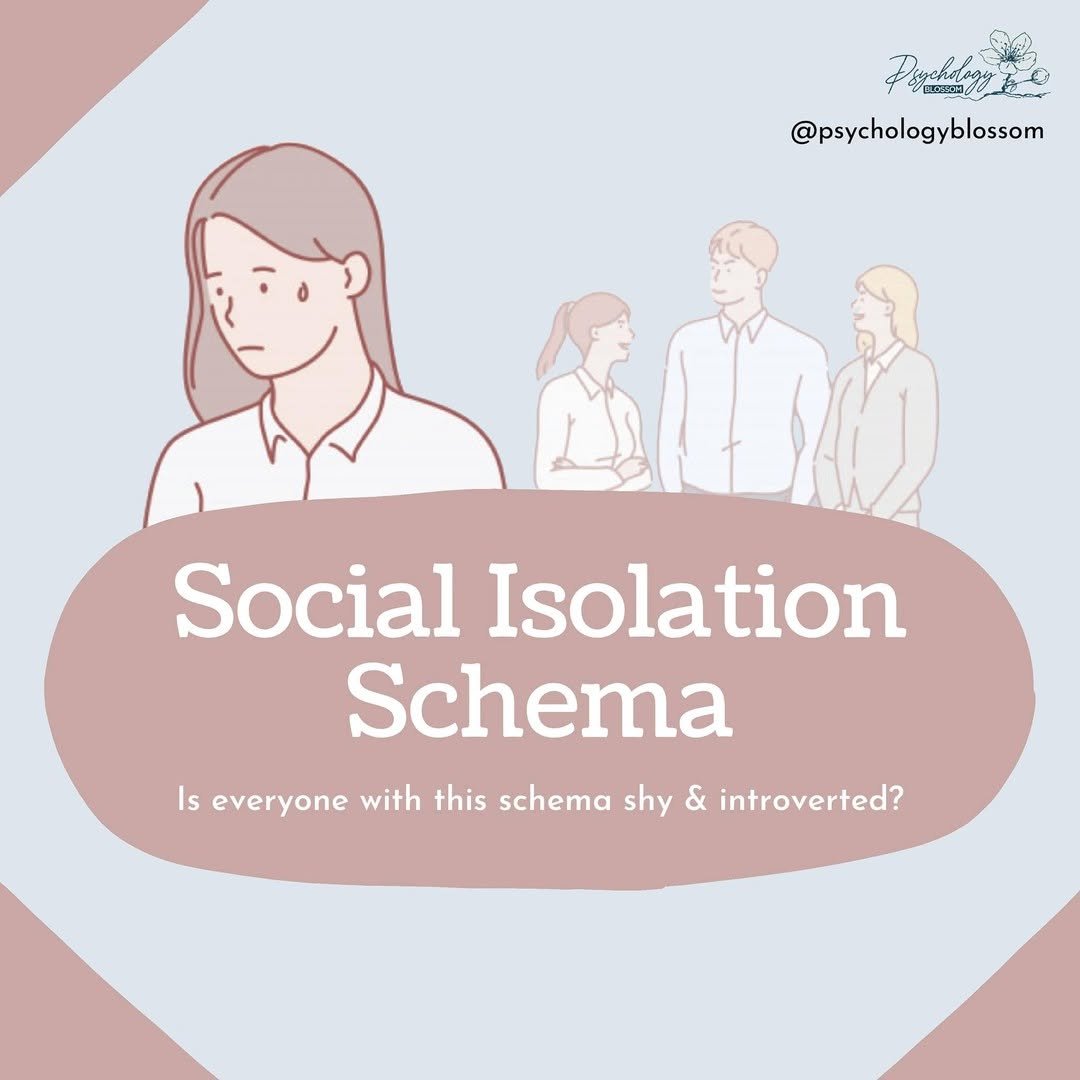Before diving into specific schemas, you might want to read our
introduction to Schema Therapy.
It provides a clear overview of the model and how schemas are understood and worked with in therapy.
Social Isolation Schema: Understanding the Feeling of Not Belonging
Do you sometimes feel like you don’t fit in with others? Almost all of us have felt this way at least once in life, perhaps most prominently during adolescence, when social belonging plays a critical role in shaping identity and self-esteem.
However, when feelings of isolation, disconnection, and being fundamentally different persist over time, they may indicate the presence of the Social Isolation Schema. Humans are social beings, wired for connection, validation, and belonging. This schema disrupts that natural drive. It can make it difficult to bond with others, while also creating a sense of discomfort when left alone.
Recurring Thoughts in a Social Isolation Schema
Individuals with this schema often experience recurring beliefs and self-talk that reinforce their sense of being excluded. Examples include:
- “I feel like I don’t fit in.”
- “Everyone thinks I am strange or weird.”
- “No one truly understands me.”
- “It’s very difficult for me to connect with others.”
- “I am different from everyone else.”
- “It would take too much effort for people to accept me.”
Interestingly, individuals with this schema may mask it well. Outwardly, they can appear confident or sociable, but internally they continue to feel disconnected. Some signs you may observe in others include:
- Being outgoing at parties yet feeling deeply lonely inside
- Appearing attractive and charismatic but feeling insecure about others’ perceptions
- Suppressing personal opinions or preferences in order to blend in
- Maintaining many friendships while still feeling profoundly misunderstood
Cycle of Social Isolation Schema
✽ Initial Development
- Discrimination: Growing up in a family different from others in ethnicity, religion, language, or socioeconomic status can create an early sense of not belonging.
- Relocation: Frequent moves in childhood may disrupt social bonds, making it harder to develop secure long-term friendships later in life.
- Unfairness: Being treated differently than siblings, such as being labelled the “black sheep,” can solidify feelings of exclusion.
- Trauma: Experiences of bullying or abuse can amplify the feeling of being fundamentally different or unwanted.
✽ Reaction to the Schema
- Surrender: Going along with others, suppressing personal thoughts to gain acceptance.
- Avoidance: Withdrawing from social opportunities out of fear of rejection or exclusion.
- Overcompensation: Becoming extremely extroverted, constantly seeking social validation, or using substances to cope.
✽ Perpetuation of Social Isolation Schema
- For example: Choosing to avoid a social gathering to prevent rejection, missing opportunities for new connections, and reinforcing the belief of being unwanted. This cycle repeats, strengthening the schema over time.
Effects of a Social Isolation Schema
The impact of this schema can range from subtle difficulties in relationships to serious mental health challenges. If left unchecked, it can create long-term issues in personal, academic, and professional life.
- Withdrawal: Avoiding social activities, which affects interpersonal relationships and reduces emotional support systems.
- Mental Health Issues: Strong links with anxiety, depression, and chronic loneliness.
- Self-Harm: Coping mechanisms may include self-destructive behaviours or suicidal thoughts.
- Substance Abuse: Turning to alcohol or drugs to feel more comfortable in social settings.
- Professional Struggles: Avoiding teamwork, networking, or career opportunities that require social integration.
Managing Social Isolation Schemas
The Social Isolation Schema can be addressed through Schema Therapy, a comprehensive approach that goes beyond surface-level coping strategies. Unlike traditional cognitive therapy, Schema Therapy delves into early life experiences, helping clients uncover the roots of their beliefs while building healthier alternatives.
Psychology Blossom offers therapy programs tailored to individuals struggling with feelings of isolation and disconnection. Therapists work collaboratively with clients to identify the triggers of the schema, challenge limiting beliefs, and rehearse adaptive behaviours.
- Exploring Origins: Uncovering early experiences of exclusion and recognising how they influence current behaviours.
- Imagery and Role-Play: Practicing adaptive behaviours in imagined or role-played social scenarios to build confidence.
- Behavioural Homework: Setting small social goals, such as expressing an opinion during a group conversation.
- Support System Involvement: Engaging friends or family to positively reinforce efforts toward social participation.
Practical Tips to Overcome Social Isolation
Alongside therapy, individuals can take proactive steps to challenge their schema in daily life:
- Start Small: Join a small group or community where you feel relatively safe and gradually expand your comfort zone.
- Challenge Inner Dialogue: Notice self-critical thoughts such as “I don’t belong” and replace them with balanced alternatives.
- Build Authentic Connections: Focus on quality over quantity in relationships. One supportive connection can counteract feelings of isolation.
- Practice Vulnerability: Share a little more of your authentic self in conversations rather than trying to blend in.
- Self-Care: Engage in activities that nurture your well-being, as loneliness often feels more intense when your overall health is compromised.
We recommend This Video to those who want to learn more about the Social Isolation Schema.
